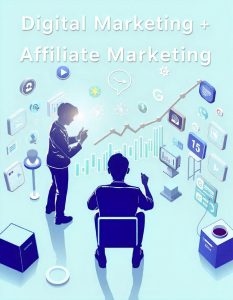What is Email Marketing?
Email marketing is a cornerstone of digital marketing strategies, offering a direct way for businesses to engage with their audience. By sending personalized messages directly to potential or existing customers, businesses can boost brand awareness, drive traffic to their websites, and nurture customer relationships. In the realms of SEO, content marketing, e-commerce, and social media marketing, email remains a critical tool to generate leads and increase conversions.
Affiliate Marketing for Remote Workers: How to Start Earning Commissions from Your Digital Presence
Email Marketing in Digital Marketing: Types and Approaches
Email marketing takes various forms, each serving distinct purposes in digital marketing:
- Promotional Emails: Drive sales, announce product launches, and share limited-time offers. These emails are highly effective for e-commerce businesses looking to push products.
- Newsletters: Offer valuable content, updates, and insights. They help with content marketing by distributing blog posts, articles, and guides directly to your subscribers.
- Transactional Emails: Essential for e-commerce, these provide order confirmations, shipping updates, or account details, keeping customers informed about their purchases.
- Drip Campaigns: Ideal for nurturing leads through the sales funnel. These pre-scheduled, automated emails help convert website visitors into customers over time.
In all these approaches, the primary goal is to engage, inform, and encourage subscribers to take action, whether it’s visiting a website, making a purchase, or sharing content.
How To Make Money With The Moniepoint Bank App
Why Email Marketing is Essential in Digital Marketing
In today’s crowded digital landscape, email marketing stands out because it offers direct communication with your audience, unlike social media or organic search where algorithms determine visibility.
1. SEO Benefits through Engagement
Although email marketing doesn’t directly impact search engine rankings, it plays an indirect role in SEO. For instance, sharing blog posts or landing pages via email boosts website traffic, which in turn can enhance your website’s SEO performance. Higher engagement rates signal to search engines that your site is valuable and relevant.
2. High ROI in E-commerce
Email marketing is one of the most cost-effective tools for e-commerce. For every dollar spent, businesses see a substantial return on investment (ROI). Personalized product recommendations, cart abandonment reminders, and special offers drive conversions and sales.
3. Supporting Content Marketing
Content marketing thrives when it’s shared and consumed. Emails can distribute blog posts, case studies, whitepapers, or how-to guides directly to an audience who has already shown interest in your brand. This creates a reliable feedback loop, ensuring your content reaches the right people.
4. Boosting Social Media Engagement
Emails can also amplify your social media marketing efforts. Including social media buttons or embedding your latest posts within email newsletters helps grow your social following, increasing the visibility and reach of your digital content.
Key Benefits of Email Marketing
1. Driving Conversions and Sales
Emails are effective at turning leads into customers, particularly in e-commerce. Product recommendations, promotions, or special discounts encourage immediate action, such as making a purchase or signing up for a service.
2. Building Long-Term Relationships
Email marketing fosters trust by delivering consistent value to subscribers. This could be through educational content, industry insights, or exclusive offers, keeping your brand top of mind for future purchases.
3. Brand Awareness
Every email sent is an opportunity to remind your audience about your brand. Regular, valuable emails help increase brand recognition and ensure your brand is the go-to choice when customers are ready to purchase.
4. Cost-Effective Marketing
Compared to other forms of digital marketing like paid ads, email marketing remains incredibly cost-effective. You can reach a large audience at a relatively low cost, making it a great tool for businesses of all sizes.
Affiliate Marketing with Us – Sell our Digital Products as an affiliate marketer
Best Practices for Email Marketing Success
To truly succeed with email marketing, it’s essential to follow these best practices:
1. Build a Targeted Email List
A quality email list is your most valuable asset. Grow your list organically by offering incentives such as eBooks, discounts, or exclusive content to those who subscribe. Avoid buying email lists, as this can harm your sender’s reputation and lead to low engagement.
2. Segment Your Audience for Better Targeting
Not all subscribers are the same. Segment your list by demographics, purchasing behavior, or interests to send more personalized and relevant messages. Segmentation ensures your emails resonate with each group, leading to higher engagement and conversion rates.
3. Craft Engaging Subject Lines
Your subject line is the gateway to your email. Make it short, compelling, and relevant to boost open rates. Test different approaches, such as personalization or creating a sense of urgency to see what works best for your audience.
4. Optimize Content for Value and Readability
The content of your emails should provide clear value. Whether it’s a product update, a helpful tip, or an exclusive offer, make sure the message is concise and easy to follow. Use visuals and bullet points to enhance readability and engagement.
5. Ensure Mobile Optimization
With most users opening emails on mobile devices, it’s crucial to ensure your emails are mobile-friendly. Use a responsive design that adapts to different screen sizes and make sure your CTAs are easy to tap on smaller screens.
6. Leverage Automation for Efficiency
Automation is a powerful tool in email marketing. Set up automated welcome sequences, abandoned cart reminders, or post-purchase follow-ups to maintain consistent communication without manual effort.
How to Earn Money Online – The Ultimate Guide to Financial Freedom
Types of Email Campaigns in Digital Marketing
- Newsletters: Distribute regular updates and valuable content to keep your audience engaged.
- Promotional Emails: Drive immediate action with special offers, discounts, or flash sales.
- Drip Campaigns: Nurture leads over time with a series of scheduled emails, guiding them through the sales funnel.
- Abandoned Cart Emails: A must-have for e-commerce. These emails remind customers of items left in their cart, often incentivizing them with discounts to complete their purchase.
- Re-engagement Campaigns: Reach out to inactive subscribers with a special offer or personalized message to reignite their interest in your brand.
Email Marketing’s Role in Digital Success
Email marketing remains one of the most powerful and reliable tools in digital marketing. Whether you’re driving sales for an e-commerce store, boosting engagement through content marketing, or increasing brand awareness through social media integration, email plays a pivotal role. By following best practices such as segmentation, mobile optimization, and automation, you can create high-impact email campaigns that drive measurable results for your business.
Top Free Digital Marketing Online Courses to Boost Your Skills (Get List And Websites)
Subscribe to Safegate World for daily updates.
Check Out Our Premium Services
To Advertise, Advertise Your Affiliate Links on Safegateworld.com
Become a Digital Marketer – Your Complete Guide with 500 Digital Marketing Sites To Start Your Career Immediately!
Related Articles
Can Digital Marketing Make You Rich?
Digital Marketing and Affiliate Marketing
What Is Search Engine Optimization (SEO)?
Pay-Per-Click (PPC) Advertising












